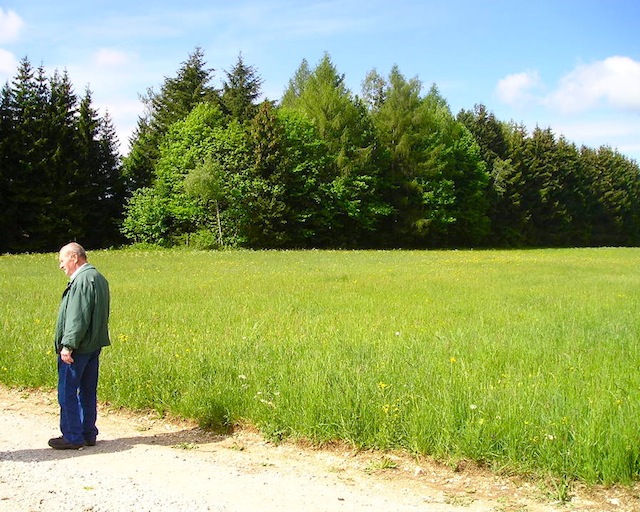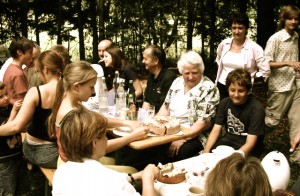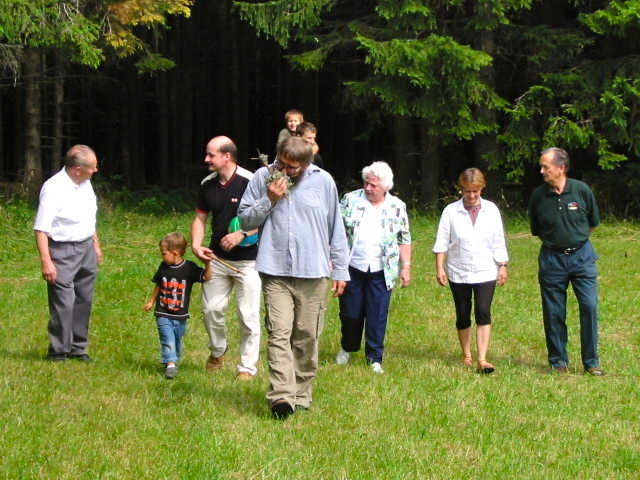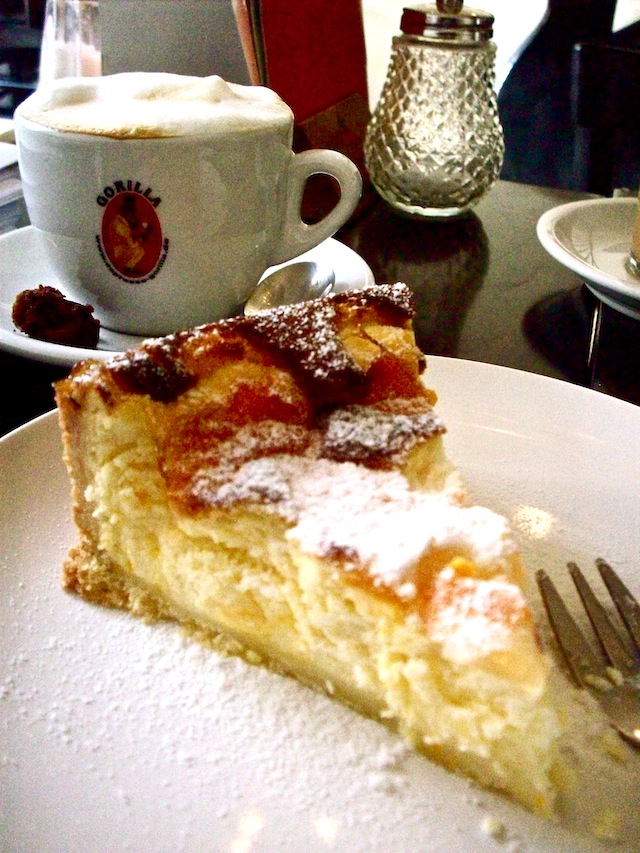Eating in German: Schwabian Potato Salad
August 31, 2009

I grew up speaking in German, and I grew up eating anything but. Schnitzel, sauerkraut, bratwurst? Never. If it was puddled in butter, wrapped in gravy, or leaking grease, my mother did not make it. I remember her once exclaiming about German food, “It’s all so heavy! They even cook the peas in cream!” So I grew up eating couscous and bulgur, slow-cooked stews, stir-fry, and salmon. But not a single Spätzle graced our table.
This was all ok with me. My father is from Germany, so my rare cravings for Würstchen and Läberkäs were satisfied on our trips to the country every two years or so. And while my brothers seemed never to get enough schnitzel (seriously, never enough), I was maxed out on potatoes by day three.
Still, some of my strongest (and fondest) childhood memories center around German food. My grandfather owns a piece of property on the Schwäbische Alb, a low mountain range in the South of Germany comparable to the weathered Appalachians. Every available Pfister would gather, and we’d have a bonfire and roast as many types of wurst as Aldi and Lidl had on sale.
There would be loaves of fresh, crusty bread, potato salad done in the German style with vinegar, oil, salt, Kräutersalz, and onion, Fleishsalat (strips of bologna mixed with mayonnaise, gouda, eggs, and pickle), cucumber salad, and beer – lots of beer. For the kids, there was süsser Sprudel and gelber Sprudel, both sweetened types of seltzer water.

The grown ups would sit around the fire and gossip, while we cousins ran around the woods building houses out of bark, moss, and small stones for elves or catching crickets in the sunny neighboring field. Bocce ball was popular with everyone, and for some inexplicable reason, the kids fought over the right to mow the lawn with a rickety, unmotorized push-mower with scissoring blades. We never left the Eichland, the Land of Oaks, until late at night and not until someone had brought out a guitar and started a round of “Where Have All the Flowers Gone.”

Then there were my uncle Helfried’s tacos. I know, tacos are not German. But when you get a gaggle of Very German people together who have only heard that Mexico is a country by hearsay, and you let those people make tacos – tacos become German.
Friedel, as we all call him, is a legendary cook – though incidentally also the cook who elicited the peas and cream exclamation from my mother. The beef filling he makes is simply simmered with oil and a Maggi taco seasoning packet (shh), but so silky and rich and deliciously bad for you. We make crêpes instead of tortillas or taco shells, which used to be impossible to find in Germany (I had an uncle who once took back boxes of taco shells in his suitcase after visiting us). The crêpes, slightly sweet, soak up the juices from the meat and other typical taco fillings, like tomatoes, lettuce, sour cream, and cheese, making them messy, but wonderful things to eat.
And how could I talk about eating in German without talking about Kaffee und Kuchen? No matter what you’ve eaten or when you last ate, you will, at 3 o’clock, stop what you’re doing, go home or to a coffee house and have a cup of coffee and a slice of cake.
My grandfather lives in what the Germans call a Hof, a small cul-de-sac lined by houses. We can’t walk in or out of the Hof without my grandfather’s neighbor, Emma, sticking her head out the window for a little chat. Wilson-style, our only interactions are through that window, and we aren’t entirely sure if she has legs. On more than one occasion, Emma has passed us a home made cake through the window to eat for Kaffee und Kuchen. Her signature cake is a cheesecake made with Quark, a creamy curd cheese, and mandarin oranges. The taste of that cake and the smell of coffee still filters through my memory and the yellow-brown curtains and onto the ageless dining room table in my grandfather’s house.
For quantity (and baking brilliance), however, no one rivals Annagrette Weber, a woman to whom the phrase, “No more cake, please,” means nothing. On a recent visit to Rolf and Annagrette’s house, Annagrette said, “Oh, I was feeling tired today, so I didn’t make that many cakes.” My mother and I heaved a sigh of relief, only to round the corner to find the table decked for four with one chocolate cherry cake, a fruit torte, a linsertorte, a butter cake, and lemon-quark bars. “You have to have a piece of each.” Yes, Annagrette.

In the spirit of Annagrette, I’m going to try to eat as much as I can of as many different things as I can. And maybe by the time I leave, I won’t just be speaking in German, but eating in German too.
Schwäbischer Kartoffelsalat (Schwabian Potato Salad)
This recipe was one of my grandmother’s. It’s incredibly easy – the south German take on that hot-bacon-chives-vinegar business you’ll find if you try to look up German potato salad online. The tricky thing, though, is that one of the central (er – only) seasonings in this dish is sold strictly in Germany. Which makes this recipe hard for you to make at home. The spices used in the Kräutersalz are as follows: salt, parsley, dried onion, pepper, oregano, dried garlic, celery seed, and rosemary. So you might be able to recreate the seasoning following that list and using your mortar and pestle – or you can mess around with some spices of your own.
6 medium-sized boiling potatoes
1/4 cup vegetable oil
1/4 cup vegetable broth
1/4 cup rice wine vinegar
1/2 of a small white onion, finely chopped
1/2 tsp. sugar
Salt, to taste
Black pepper, to taste
Kräutersalz, to taste
Cook potatoes in boiling water, then peel them, and slice them thinly. Coat them with vegetable oil – mom says, “Don’t be skimpy,” (which means you might need to add more than 1/4 cup if they look dry). Add vinegar, sugar, salt, vegetable broth, and Kräutersalz to taste. My grandmother used to use white vinegar thinned with water, but my mother suggests using seasoned rice vinegar, since it’s already so mild and has a bit of sugar in it – and American potatoes aren’t as sweet as German potatoes. Allow potato salad to cool before eating. Or don’t, and eat it warm.

Yum, Yum … this delightful reading makes me crave a Linzer Torte
or Käse-Sahne Torte from the Hermannsdorfer Straße … the world’s
best Linzer and Käse-Sahne Torte!!
Oh, and yes, … Emma does have legs